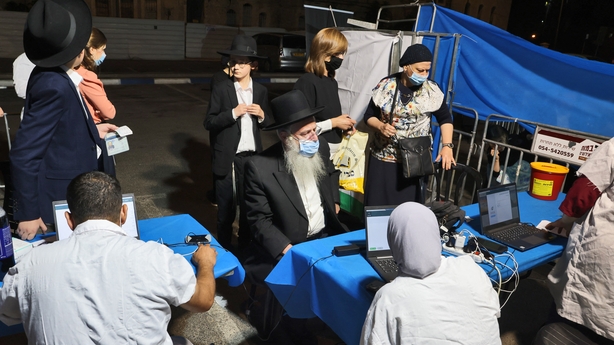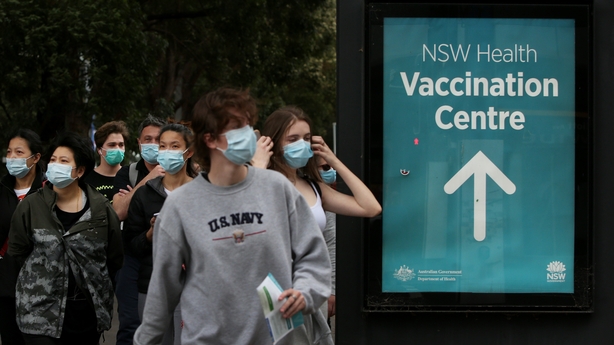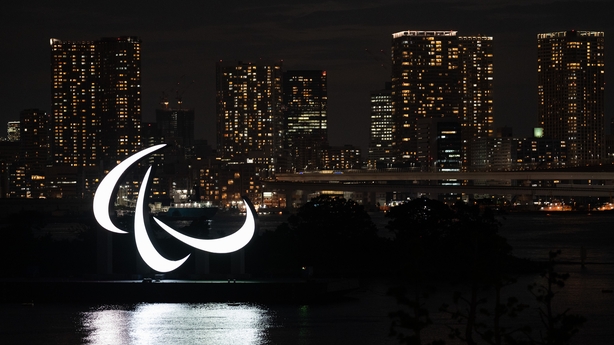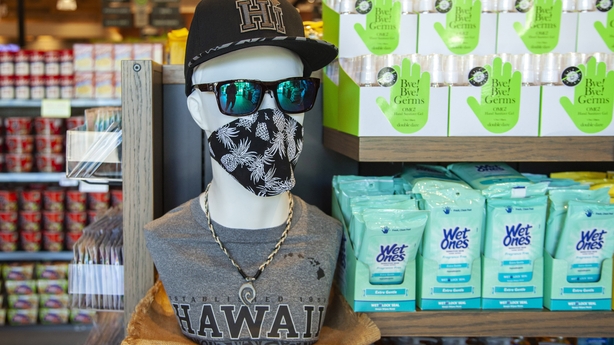More than five billion anti-Covid jabs have been given globally, an AFP tally of official sources showed today, with the worldwide inoculation drive reaching cruising speed.
While it took around 140 days to get the first billion shots into people's arms, the third, fourth and fifth billions each took between 26 and 30 days, the data show.
Nearly 40% (1.96 billion) of the five billion shots have been administered in China. India (589 million) and the United States (363 million) make up the trio of countries that have given the most jabs.
In terms of population protected among countries with more than one million people, the United Arab Emirates is the leader. It has administered 179 doses per 100 inhabitants, meaning it has fully vaccinated nearly 75% of its population.
Uruguay follows with 154 per 100 inhabitants, Israel (149), Qatar (148), Singapore (147), Bahrain (144), Denmark (143), Chile (140), Canada (139), Portugal and Belgium (138 each), China (136), Spain (134), Ireland (133) and the United Kingdom (132).
Most of these countries have fully vaccinated between 65-70% of their populations.
Some, like the Emirates, Bahrain, Israel, Uruguay and Chile have even started giving out booster shots to prolong the immunity of the fully vaccinated.
France, which will start giving booster shots from mid-September, is not far behind, with 126 doses injected per 100 people and 62% of the population completely vaccinated.
It has bypassed the United States which has given 110 doses per 100 inhabitants, with 52% completely vaccinated.
Most poor countries have now started to vaccinate, mainly thanks to the Covax scheme, but the coverage remains very unequal.
High-income countries (as defined by the World Bank) administered an average of 111 doses per 100 inhabitants compared with just 2.4 doses in low-income countries.
Greece is set to end free Covid testing for unvaccinated people, in a move hoped to boost inoculation rates and head off any renewed spike of the Delta variant.
The country has recorded 13,422 deaths since reporting its first Covid outbreak in February 2020.
New measures which will come into effect on 13 September stop short of forcing people to take a jab, but end free testing and oblige unvaccinated persons to test either once or twice a week, depending on their profession.
The costs of the rapid test, set at €10, is a sizeable chunk of money for people in the crisis-hit country, where salaries average €1,161 a month.
Authorities said some six million people in the country of 11 million had already received one or two doses of a coronavirus vaccine, but that a million more were needed to build adequate immunity.
"In contrast to autumn of last year, this autumn everyone can be vaccinated," said Health Minister Vassilis Kikilias.
"Do we live, or play Russian roulette with the coronavirus?"
Free testing for vaccinated people would continue, Mr Kikilias said. "These measures are not punitive," he said.
"They are our duty to all those who went through 18 months of the pandemic carefully, those who lost their shops, jobs, had to work from home to protect themselves."
About 53%of the Greek population is fully vaccinated. Authorities hope to increase that figure to 70% by the autumn.
Israel's Covid-19 vaccine boosters show impact on Delta

Less than a month into a Covid-19 vaccine booster drive, Israel is seeing signs of an impact on the country's high infection and severe illness rates fuelled by the fast-spreading Delta variant, officials and scientists say.
Delta hit Israel in June, just as the country began to reap the benefits of one of the world's fastest vaccine roll-outs.
With an open economy and most curbs scrapped, Israel went from single-digit daily infections and zero deaths to around 7,500 daily cases last week, 600 people hospitalised in serious condition and more than 150 people dying in that week alone.
On 30 July, it began administering a third dose of the Pfizer/BioNtech vaccine to people over 60, the first country to do so.
On Thursday, it expanded eligibility to 40-year-olds and up whose second dose was given at least five months prior, saying the age may drop further.
In the past ten days, the pandemic is abating among the first age group, more than a million of whom have received a third vaccine dose, according to Israeli health ministry data.
The rate of disease spread among vaccinated people age 60 and over - known as the reproduction rate - began falling steadily around 13 August and has dipped below 1, indicating that each infected person is transmitting the virus to fewer than one other person.
A reproduction rate of less than 1 means an outbreak is subsiding.
After reaching one of the highest per-capita infection rates in the world this month, the question now is whether Israel can battle its way out of a fourth outbreak without imposing another lockdown that would damage its economy.
Evidence has emerged showing that while the vaccine is still highly effective in preventing serious illness, its protection diminishes with time.
But there is no consensus among scientists and agencies that a third dose is necessary, and the World Health Organization has said more of the world should be vaccinated with a first dose before people receive a third dose.
About a million of Israel's 9.3 million population have so far chosen not to vaccinate at all and children under 12 are still not eligible for the shots.
Since Delta's surge, Israel has reimposed indoor mask wearing, limitations on gatherings and ramped up rapid testing.
Its "living with Covid" policy will be tested next month, when schools reopen after summer break and when the Jewish holiday season starts, with families traditionally gathering to celebrate.

Australia pandemic panel backs reopening targets despite Sydney outbreak
Australia can proceed with its reopening plans when the country reaches 70%-80% vaccination levels, the government's pandemic modelling adviser said, even as some states hinted they may not ease border curbs if Sydney fails to control its Delta outbreak.
The Melbourne-based Doherty Institute said the country's focus must shift to limiting the number of Covid-19 deaths and hospitalisations, from its current zero-cases strategy, when at least 70% of the country's population above age 16 is fully vaccinated.
"This level of vaccination will make it easier to live with the virus, as we do with other viruses such as the flu," it said in a statement.
"Once we reach 70% vaccine coverage, opening up at tens or hundreds of cases nationally per day is possible."
Currently, 30% of Australia's adult population has been fully vaccinated while 53% have had at least one dose.
Australia in July unveiled a four-stage plan back to greater freedoms with higher vaccination rates
But Queensland and Western Australia states flagged they may not stick with the agreement as it was framed when case numbers in Sydney were much lower.
Prime Minister Scott Morrison acknowledged the concerns of some states from the Sydney outbreak but said "forever lockdowns" will do more harm than good to the country.
"It doesn't matter whether it's 30 cases or 800 cases, the conclusions are the same, and that's what the Doherty Institute said ... we can do this safely and we do need to do it," Mr Morrison told Nine News.
Australia has suffered less from the coronavirus pandemic than many other developed countries with about 44,600 cases and 984 deaths. But a third wave of infections from the Delta variant has plunged Sydney and Melbourne, its largest cities, and capital Canberra into a weeks-long lockdown.
A total of 753 cases were reported in NSW, down from 818 yesterday, although daily infections continue to linger near record levels. 74 deaths have been reported from the latest outbreak, although the rate of deaths has slowed from last year.
New Zealand to skip Paralympic opening ceremony over virus fears
New Zealand's Paralympic team said it will not attend the opening ceremony in Tokyo over coronavirus safety fears, as infections surge in the Japanese capital.
Organisers have reported 161 Covid-19 cases linked to the Paralympics so far, mostly among staff and contractors living in Japan but also including six athletes.
Paralympics New Zealand said its athletes would not take part in the opening ceremony, where two flagbearers usually lead teammates into the Olympic Stadium.
"Our team will not be attending as we continue our commitment to our Covid-19 Operating Principles and Guidelines, aimed at keeping our team as safe as possible," it said in a statement.

Instead of appointing flagbearers, two athletes will be given symbolic "leadership roles".
Throughout the pandemic, New Zealand has pursued a "Covid zero" elimination strategy, resulting in just 26 deaths in a population of five million.
But a national lockdown is currently in place to curb the spread of the highly transmissible Delta variant, after a virus cluster broke a six-month run of no local cases.
New Zealand is the only one of the 162 Paralympic delegations that has confirmed it will skip the evening ceremony, International Paralympic Committee spokesman Craig Spence told reporters.
"We've got to respect the decision," he said, adding that team chief Fiona Allan had told him that despite strict virus countermeasures, they wanted to be "super safe".
There are 32 Paralympians on the New Zealand team, according to Tokyo 2020.
Some other countries and territories have reduced the number of representatives at the ceremony for various reasons including Covid-19 and heat concerns.
Japan's virus situation has worsened dramatically in the weeks since the 23 July Olympic opening ceremony, with the country recording more than 25,000 daily infections several times in the past week.
Hawaii governor urges visitors to stay away amid Covid surge
Hawaii Governor David Ige urged residents and visitors to restrict travel to the US state to essential business activities amid a surge in cases of Covid-19 in the islands.
The governor highlighted the restrictions on restaurant capacities and limited access to rental cars and said that those who choose to visit the islands will not be able to enjoy a typical Hawaii holiday.

"We are seeing more Covid patients in our hospitals and ICUs are filling up," he said, adding that the state is working towards expanding healthcare facilities.
The governor said that he supported Honolulu Mayor Rick Blangiardi's announcement on restricting indoor gatherings to ten people and outdoor gatherings to 25.
So far 62% of the state population has been fully vaccinated. Mr Ige urged others to get vaccinated as soon as possible following the US Food and Drug Administration's full authorisation of the Pfizer/BioNTech vaccine.
The latest request comes after the governor re-imposed Covid-19 restrictions earlier in the month limiting social gatherings, as the Delta variant of the coronavirus pushed cases and hospitalisations in the United States to a six-month high.

